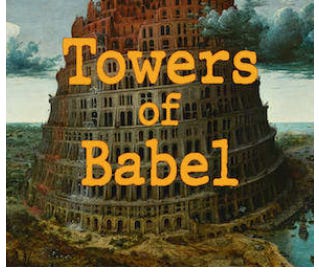I first heard the story of the Tower of Babel in Sunday school, when I was about nine years old.
Back then, my teachers said the Babel story was the Biblical explanation of why the world is a constellation of different nations and languages: Yahweh — aka The Mighty Sky God (TMSG) — didn’t want a single people who spoke a single language to work together to build such a mighty ziggurat because… because it rose up… and it… uhhh… well, I wasn’t sure why. TMSG did plenty of things that seemed arbitrary and unfair to nine-year-old me, so when He broke up the Babel project by confounding humanity’s language and sending us all packing to the four corners of the earth, I thought: Yup, totally on-brand for wacky ol’ Yahweh.
A few years later, that interpretation — and most of the Bible, to be honest — seemed superstitious, incoherent, divisive, painfully absurd, and not worth my time. Why, I wondered, does anyone believe this nonsense?
As an adult, though, I had the nagging feeling that I’d missed something important, so I read the story again. And it’s been a revelation of sorts, especially with Leon Kass as my guide.
In his book, The Beginning of Wisdom: Reading Genesis…
… Kass is less interested in the nature of G-d, and more interested in what Scripture might be saying about the nature of Man. He reads the Hebrew Bible not as divine revelation, but as a source of wisdom. To study Genesis with Leon Kass, you don't need to be a believer. You simply need to be curious.
Here’s a Kass sampler re: the tower of Babel, along with a few annotations by me:
The project of creating order, the meaning and goal of Babel, is rooted in logos. Speech and language, reason and the arts are at the heart of the story…. Poetic craft and linguistic subtlety are enlisted to sound an alarm about language and crafts.
Language to sound an alarm about language echoes one of my main goals for this Towers of Babel project — journalism to sound an alarm about journalism specifically, and storytelling more generally.
The story of the city and tower of Babel... shows the impossibility of transmitting the right way through the universal, technological, secular City.
Which is where most of us live today.
Human reason gradually creates in speech a complete linguistic world, layered over but distinct from the given, natural world. This second, shadow world, though it was invited by the articulated natural world, gains independence from it. The word is not the thing; the map is not the territory.
As you look at this photo of a man tending to the dead after a poisonous gas attack in Syria, pay close attention to your reaction:
Now imagine you were actually there, in Syria, standing in this place, surrounded by death. Your reaction, I bet, would be radically different.
The word is not the thing… and neither is the picture.
But because speech is colored always by human perceptions, passions, interests, and desires, the world as captured in language is necessarily partial — both incomplete and biased — and ever pregnant with the human impulse to do something to it. Language, therefore, conveys less the world as it is than it does the self-interested and humanly constructed vision of that world.
If true, then journalists are hobbled by problems that are unrelated to the rise of the internet and the implosion of the industry’s old business model.
Speaking animal, rational animal, artful animal, political animal, animal distinguishing good and bad, and opining about the just and the unjust — it is all one package: man becomes truly human only when he lives in a polis, providing for himself and ruling himself by his own light of reason, through speech and shared opinions about good and bad, just and unjust. Though the biblical author almost certainly did not read Aristotle's Politics, he seems to share a similar view of the meaning of the city — though not of its goodness. Precisely what Aristotle celebrates, Genesis views with suspicion.
Uh oh.
Mistaking their crafted world for the whole, men live as cave dwellers, ignorant of their true standing in the world and their absolute dependence on Powers not of their making and beyond their control. The city that does not look beyond itself to the truly transcendent realm cannot be a home for what is best in the human soul.
Looking to the heavens for moral guidance cannot succeed; the heavens may, as the Psalmist says, reveal the glory of God, but they are absolutely mute on the subjects of righteousness and judgment. One can deduce absolutely nothing moral even from the fullest understanding of astronomy and cosmology.
Science is necessary… but not sufficient.
The causes of our malaise are numerous and complicated, but one of them is frequently overlooked: the project of Babel has been making a comeback. ... Can our new Babel succeed? And can it escape — has it escaped — the failings of success of its ancient prototype? What, for example, will it revere?… Will it be self-critical? Can it really overcome our estrangement, alienation, and despair?
The lessons of Babel seem especially relevant right now. Not because we necessarily need to take the next step in the Biblical narrative—to walk with Abraham. Many other paths are possible, as history has shown us, and the future will offer paths we've not yet imagined. But since each of us must choose a way forward, which one is best?
It’s hard to know because it’s difficult to see clearly. So many new Towers of Babel are on the rise.






